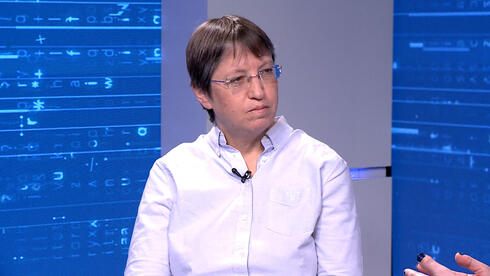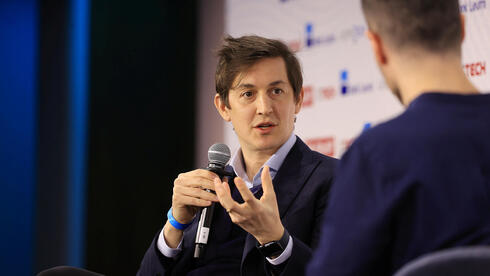
"ChatGPT will bring with it a wave of creativity and innovation"
Dorit Dor, Chief Product Officer at Check Point, who was speaking at Calcalist’s developer conference, also warned that ChatGPT may become a tool for cyber attackers: "It makes the attack dimension accessible to many more people in a simple way"
Dorit Dor interview
"We don't know how to predict exactly when a revolution will happen, that is, when does a “change” become a” revolution”. We know how to say that something is likely to happen," explained Dorit Dor, Chief Product Officer at Check Point, in a conversation with Calcalist reporter Sophie Shulman as part of Calcalist’s developer conference held in cooperation with the Mamram and Ofek alumni associations.
"There are many revolutions in the making," Dor said. "Some of them really happen, some of them happen later than we thought and some of them will be cut short. The idea is to identify many possibilities, invest in them proportionally to their place in our lives and their importance and let them develop together with the market."
Can you give an example of big things that have changed over the years?
"Many years ago, a new standard for computer communication 6IPV came out. Until that time there was 4IPV, and for a long time they said that 6IPV would soon dominate and all kinds of solutions were required, but it ended up taking many years. Investing all of your energy in 6IPV was probably not the right decision at that time, but over the years you had to invest enough so that when 6IPV became a real thing you would be there.
"The same goes for quantum computing. Compared to where we were a few years ago, it is amazing, but it is still very far from where it relates to our lives. There are all kinds of other industries that are closer to using this technology, but it will take some time for that to happen."
How do you at Check Point determine your strategy and say - this is what we need to get into?
"One of our advantages is that we are in the software field and therefore can make many attempts. So we see all kinds of trends and initially offer 'simple' solutions for them, check with our customers and see what interests them, and in what catches on we invest more. We also follow attack trends, technological trends, talk to many customers, large companies and startups about what they are working on. In the end, a picture of trends is formed, and we choose those trends that will have a significant impact in the field in which we are engaged."
Do you start cautiously?
"Yes, because there are several things at the same time and there are external factors that affect us, such as the coronavirus, which had a great impact on technology implementation processes in companies and greatly accelerated certain trends, but there were other things that were used less and happened less. There are things that the coronavirus accelerated their implementation, so if you were prepared ahead of time for how to cope, you were in a good position during the coping phase."
How do you decide what to develop on your own and what to acquire from others, thereby shortening the path?
"You will be surprised to hear that there are not so many purchase options. There are many companies on the market, many of them are not suitable for you because of the valuation, because of the culture or the type of solution that is not suitable for your sales and customers. When you find something that is suitable, it is less important whether you have also developed such an ability in-house or not. There are many reasons to buy even if you have already developed. If you start with internal development, you will know the area much better and then you will know what is suitable for you to buy. In many cases, the purchase comes when you have some understanding of the field and know why it will help you accelerate."
Do you think ChatGPT is a revolution or just background noise?
"I think it's a big and significant event, but not necessarily because of the innovation in ChatGPT itself. When the iPhone came out, it made it possible to do many things that could already be done before, such as surfing the internet, but it also created a situation where it was provided to a lot of people in a lot of ways, and people found how to ride the wave and do a lot of other things with it that we didn't necessarily expect at the beginning. Artificial intelligence has been around for many years, but it was used only among experts. Here it is used through a language model and the answers are provided in a language everyone can understand. It is accessible to everyone without crossing a very deep technological barrier. I'm sure there will be a wave of creativity and innovation that is not necessarily only the same creativity and innovation currently in ChatGPT itself."
What about the dangers? Does it create a more convenient tool for hackers and cyber threats?
"Definitely. It can shorten the defense process and the attack process. We started to study the subject and at first we tested attacks that use a language like phishing. Then we tried to test how it can be used to write attacks, and we made it a tool that shortens the writing of an attack. But to the same extent this tool is also used by defenders, it is not only by the attackers."
So the attackers are advancing and this also gives tools to the defenders?
"This is especially for the attackers. It doesn't necessarily make the deep attacks easier, but it makes the attack dimension accessible to many more people in a simple way, just as it makes technology accessible to everyone."
Even giant entities like Google make mistakes. Did they rush their AI development?
"I'm not a Google spokesperson, but from an observer's point of view, Google has technological depth and capabilities, and the impression is that they simply didn't prepare enough. They realized that there was excitement and anticipation around it, so they had to come very prepared, to understand what the models were bringing to the table. It was disappointing that they set such a poor example. We are all human and we can all make mistakes, but they didn't have to bring it to the fore in that announcement."
















